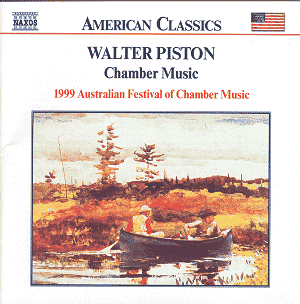WALTER PISTON
Quintet for Flute & String Quartet (1942)
String Sextet (1964)
Piano Quartet (1964)
Piano Quintet (1949)
 James Boswell, Michele Walsh,
Dimity Hall, Anthony Gault (violins); Theodore Kuchar, Randolph Kelly (violas);
Judith Glyde, Carol Ou (cellos); Michael Gurt, Ian Monro (pianos); and Olga
Shylayeva (flute)
James Boswell, Michele Walsh,
Dimity Hall, Anthony Gault (violins); Theodore Kuchar, Randolph Kelly (violas);
Judith Glyde, Carol Ou (cellos); Michael Gurt, Ian Monro (pianos); and Olga
Shylayeva (flute)
Recorded at Sir George Kneipp Auditorium, Townsville, Queensland, in July
1999
 NAXOS AMERICAN CLASSICS
8.559071 [69:44]
NAXOS AMERICAN CLASSICS
8.559071 [69:44]
Crotchet
AmazonUK
AmazonUS

Though his music is not particularly well-known on this side of the Atlantic,
Walter Piston (1895-1976) is one of the most highly regarded American composers
of the twentieth century; he was also a distinguished teacher, his studies
on such matters as orchestration and counterpoint becoming standard works
of reference. It appears that he was an unusually methodical composer who
rarely found it necessary to revise anything he had written.
The pieces on this disc - presenting a substantial overview of his chamber
music - were featured at the ninth Annual Townsville Festival of Chamber
Music in Australia, at which time they were recorded. From them Piston emerges
as a composer with a very strong identity. His language is sometimes pushed
to the very edges of tonality, but overall stays within the bounds of
conventional key-signatures yet without ever lapsing into blandness. Another
striking feature of his music is that it has the sort of contrapuntal logic
and inevitability we associate with that of J S Bach; and he was clearly
a master of the intimate instrumental dialogues which characterise the greatest
chamber music.
The Flute Quintet is a particularly attractive work. The first movement fully
lives up to its grazioso marking and the quicksilver third movement
vivace e leggiero which features a wide-ranging flute solo accompanied
by pizzicato strings is pure magic. The energetic finale is a kind of moto
perpetuo (a device Piston clearly relished - it figures in all his finales).
In the long opening adagio of the String Sextet the mood is
much more sombre and the harmonic language more complex: melancholy solo
lines alternate with dense and sometimes anguished textures. The ensuing
leggierissimo e vivace assai is a complete contrast - a joyous affair
similar in character to the third movement of the Flute Quintet. In the finale
Piston achieves a reconciliation of these contrasts, bringing the work to
an end in an affirmative C major.
The Piano Quartet and Piano Quintet confirm Piston's mastery of form and
reveal further aspects of his ability to convey a wide range of moods. The
finale of the Quintet is unusual: Piston rejected the idea that an American
composer should embrace a distinctive American identity, but here he unbuttoned
himself in an uncharacteristically folksy and jazzy romp firmly based in
G major.
All four works are splendidly performed and recorded, and the disc is strongly
recommended to anyone who wishes to explore the highways and byways of American
music.
Adrian Smith

